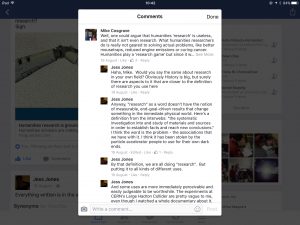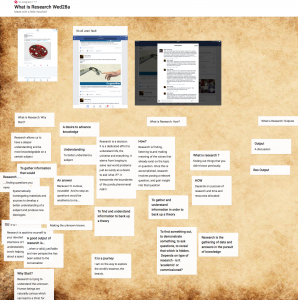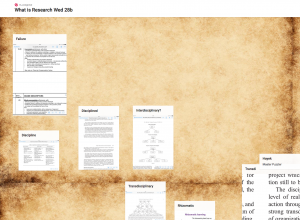I opted to lead the first week of the UCC Digital Humanities Research Colloquium this year on the question of “What is Research” because I wanted to start the year with a very basic discussion; and I wanted it to be a discussion rather than a lecture. I wanted to bring out some ideas that arose during a discussion on Facebook with some of the Phd researchers over the summer, and I wanted to play with Padlet, which I feel is useful as an interactive tool.
 The basic question arose here, on Facebook in a discussion where I suggested that we in the humanities don’t do ‘research’ but rather we do ‘re-search’; that is, in each generation, we repeat the search for the meaning of human existence in the contemporary context. Thus, we can look at the events in France from 1789 to the Revolution of 1830 as history, the original and translated texts of ‘Les Miserables’ as interpretations of the personal struggles for justice in those revolutions, the brighter but still sad stage musical as a different celebration of those, and the darker film version as humanistic ‘re-searchs’ for understandings of those stories which shed light on our contemporary situation.
The basic question arose here, on Facebook in a discussion where I suggested that we in the humanities don’t do ‘research’ but rather we do ‘re-search’; that is, in each generation, we repeat the search for the meaning of human existence in the contemporary context. Thus, we can look at the events in France from 1789 to the Revolution of 1830 as history, the original and translated texts of ‘Les Miserables’ as interpretations of the personal struggles for justice in those revolutions, the brighter but still sad stage musical as a different celebration of those, and the darker film version as humanistic ‘re-searchs’ for understandings of those stories which shed light on our contemporary situation.
As a result, the question of facts is a little different in the humanities to the traditional idea of facts. Historians obviously have to understand the difference between facts as things that happened in the past, bits of evidence from the past which survived, facts to which we attach significance, and interpretations which we construct from them so we are aware that the ‘facts’ are rarely pure and never simple – they are not just bits of data lying around waiting to be discovered. Indeed, in the humanities broadly we need to deal with ‘socially constructed truths’ which are often empirically wrong, but almost universally accepted. I never tire of drawing attention to Heisenberg’s Uncertainty Principle, and it’s implications for empirically observable facts at the most basic level of reality, or Bell’s Theorem (aka Spooky action at a distance) and the crisis of replication in the sciences to remind students that ‘the facts’ are not as clear as the layperson might think. I also throw into the mix what I call “Post Bikini Facts”: empirical facts which exist because we created them. The “Post Bikini Facts” are those things which arise because of the postwar Nuclear tests; I suppose we could also call them ‘Godzilla Facts’! Research, therefore, as a quest to uncover and interpret facts, is not that simple either.
I also wanted to introduce the need to embrace failure – universities  are allergic to failure, but it is an important part of research. Indeed, a lot of research is due to failure – all of modern chemistry could be attributed to the failure of alchemy; and all astronomy to the failure to date Easter properly. Surreptitiously, the morning of the seminar, Twitter reminded me several times that it was the anniversary of the ‘discovery’ of penicillin, a failure of sterile practice in the laboratory.
are allergic to failure, but it is an important part of research. Indeed, a lot of research is due to failure – all of modern chemistry could be attributed to the failure of alchemy; and all astronomy to the failure to date Easter properly. Surreptitiously, the morning of the seminar, Twitter reminded me several times that it was the anniversary of the ‘discovery’ of penicillin, a failure of sterile practice in the laboratory.
I circulated three readings ahead for pre-reading – two which investigated the graduate research experience; and one on transdisciplinarity because as an interdisciplinary programme it is important that we think about the nature of disciplines, interdisciplinarity and transdisciplinarity.
The three were
Margaret Kiley & Gerry Mullins (2005) Supervisors’
Conceptions of Research: What are they?, Scandinavian Journal of Educational Research, 49:3,245-262, DOI:10.1080/00313830500109550
Margaret Kiley & Gina Wisker (2009) Threshold concepts in research education and evidence of threshold crossing, Higher Education Research & Development,28:4, 431-441, DOI: 10.1080/07294360903067930
Two padlets for the Digital Humanities Seminar, Wednesday 28th Sept 2016


Leave a Reply